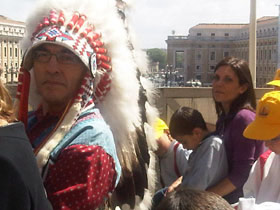CBC News
April 29, 2009
http://www.cbc.ca/canada/nova-scotia/story/2009/04/29/pope-first-nations042909.html
 |
| Assembly of First Nations National Chief Phil Fontaine, left, walks in St. Peter's Square in Vatican City ahead of a private audience with the Pope on Wednesday. |
AFN's Fontaine says he hopes statement will 'close the book' on apologies issue
Pope Benedict XVI expressed "sorrow" to a delegation from Canada's Assembly of First Nations on Wednesday over the abuse and "deplorable" treatment that aboriginal students suffered at residential schools run by the Roman Catholic Church.
In a statement, the Vatican said the Pope "offered his sympathy and prayerful solidarity" to those whose anguish was caused by some church members. The comments came during a private audience with the delegation, which included Assembly of First Nations Leader Phil Fontaine, aboriginal elders and residential school survivors.
During the meeting in the Vatican's Paul VI auditorium, which was also attended by Canadian Catholic Church representatives, the Pope emphasized that "acts of abuse cannot be tolerated in society," the statement said.
About 150,000 First Nations, Inuit and Metis children were taken from their families to attend the schools from as early as the 19th century to 1996. Most were run by missionaries from the Catholic, Anglican, Presbyterian and United churches.
Following the meeting, Fontaine, who is also a residential school survivor, called the Pope's words a "very significant statement."
While he said it did not amount to an official apology, Fontaine told CBC News he hoped the expression of regret would "close the book" on the issue of apologies for residential school survivors.
"The fact that the word 'apology' was not used does not diminish this moment in any way," he said. "This experience gives me great comfort."
Fontaine added it was important to note the delegation came to the Vatican at the invitation of Benedict himself.
"We never thought for a moment we would be here to be received by the Holy Father to talk about an experience that has caused so much pain and suffering with so many," he said.
Statement made in private
The Vatican stressed it was a private audience and no cameras or recording would be permitted, the CBC's Peter Armstrong reported on Wednesday from Vatican City.
The Pope spoke in Italian and had his words translated into English by an aide, said Edward John, grand chief of the First Nations Summit in British Columbia, who also attended the meeting.
John said the Pope acknowledged the suffering of those who are still living with the consequences of their experiences at the schools.
"I think in that sense, there was that apology that we were certainly looking for," John told CBC News.
"This is a message that needs to be heard in every church, in every parish across the country, and we are hopeful that the clergy in Canada will take this message and repeat it in every one of these churches in every parish."
Pope 'spoke from the heart': Canadian archbishop
Archbishop James Weisberger, president of the Canadian Conference of Catholic Bishops, said the Pope was "very attentive" and "spoke from the heart" during the half-hour meeting.
"He responded without notes, which indicated to me that he knew very well the situation," Weisberger told CBC News. "It was so clear that this was a very important issue for him."
Weisberger also said he hoped the historic meeting would "jolt" people into recognizing the importance of the legacy of residential schools and draw attention to the poverty and racism some aboriginal Canadians face to this day.
"The Catholic Church has got to be involved in working to help the aboriginal people be recognized, and to end a lot of the injustice," he said.
Truth and reconciliation commission in limbo
The Catholic Church administered three-quarters of residential schools across Canada, but has yet to apologize for the rampant abuse suffered by many of the 90,000 former students still alive.
Other Christian denominations implicated in abuse at residential schools have already apologized — the Anglican Church in 1993, the Presbyterian Church in 1994 and the United Church in 1998.
Prime Minister Stephen Harper also offered an apology on behalf of the government of Canada in the House of Commons last year.
There were about 130 such schools in Canada — with some in every territory and province except Newfoundland, Prince Edward Island and New Brunswick.
In September 2007, the government formalized a $1.9-billion compensation plan for victims. The Catholic Church alone paid some $79 million, the Canadian Conference of Catholic Bishops said.
The government also established a truth and reconciliation commission to examine the legacy of the residential schools.
However, the commission has been in limbo since October 2008, when Justice Harry LaForme resigned as its chairman.
Its remaining commissioners, Claudette Dumont-Smith and Jane Morley, announced in January that they will step down effective June 1.
A selection committee led by former Supreme Court justice Frank Iacobucci and comprising aboriginal and church leaders is in the process of finding new commissioners.
The First Nations' audience at the Vatican takes place less than a month before a National Day of Healing and Reconciliation in Canada.
Any original material on these pages is copyright © BishopAccountability.org 2004. Reproduce freely with attribution.